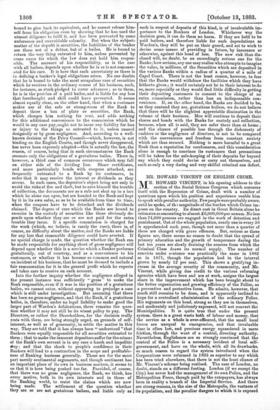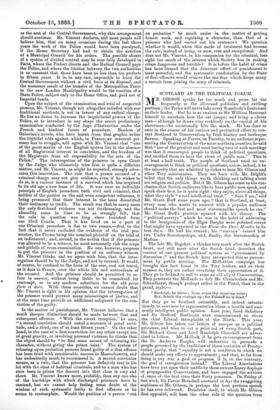MR. HOWARD VINCENT ON ENGLISH CRIME.
MR. HOWARD VINCENT, in his opening address to the section of the Social Science Congress which concerns itself with the Repression of Crime, dealt with a number of questions upon which his position and experience enable him to speak with peculiar authority. Few people were probably aware, until he spoke, of th3 magnitude of the burden which Crime im- poses on the country. Its direct cost in Great Britain alone he estimates as amounting to almost £6,000,000 per annum. No leas than 74,000 persons are engaged in-the work of detection and punishment. Out of the whole population, nearly one in every 36 is apprehended each year, though not more than a quarter of these are charged with grave offences. But, serious as these figures are, there seems no reason to doubt that the spread of primary education and the growth of temperance during the last ten years are slowly draining the sources from which the Criminal Class draws its normal supply. The number of convicts under sentence was practically the same in 1882 as in 1871, though the population had in the interval grown by nearly 12 per cent. This shows a gratifying in- crease in the average security of the community, and Mr. Vincent, while giving due credit to the various reforming agencies which have been and are at work, assigns the largest share in the improvement which has been brought about to the better organisation and growing efficiency of the Police, as a preventive and protective force. He admits, however, that much still remains to be done, and is apparently inclined to hope for a centralised administration of the ordinary Police. His arguments on this head, strong as they are in themselves, and moderately and judiciously expressed, will not convert the Municipalities. It is quite true that under the present system, there is a great waste both of labour and money, that the service as a whole is over-officered, that the small local forces are unequal to emergencies, and that invaluable time is often lost, and precious energy squandered in mere friction, through the want of a central, directing authority. Nevertheless, Englishmen are so strongly convinced that the control of the Police is a necessary incident of local self- government, and have on the whole, with all its drawbacks, so much reason to regard the system introduced when the Corporations were reformed in 1835 as superior to any which has been tried elsewhere, that there is not the least chance of Mr. Vincent's scheme being realised. The case of London, no doubt, stands on a different footing. London (if we except the City) has never had the management of its own Police, and the Metropolitan Force, though paid by the ratepayers, has always been in reality a branch of the Imperial Service. And there are strong reasons, in the sine of the Metropolis, the vastness of its population, and the peouliar dangers to which it is exposed as the seat of the Central Government, why this arrangement should continue. Mr. Vincent declares, and most people will believe him, that on many occasions during the last three years the work of the Police would have been paralysed, if the Home Secretary had had to obtain the sanction of a Municipal Council for his orders. The possible abuses of a system of divided control may be seen fully developed in Paris, where the Prefect directs and the Radical Council pays the Police, and where the friction between the two authorities is so constant that there have been no less than ten prefects in fifteen years. It is, in any case, impossible to leave the Central Government without a civil force at its disposal, and the necessary result of the transfer of the Metropolitan Force to the new London Municipality would be the creation of a State Police, subject only to the Home Office, and paid out of Imperial funds.
Upon the subject of the examination and trial of suspected persons, Mr. Vincent, though not altogether satisfied with our traditional methods, is not in favour of any radical change. He has no desire to increase the inquisitorial powers of the Police, or to introduce in any shape the secret preliminary examination conducted by the Juge d'Instruction under the French and kindred forms of procedure. Readers of Gaboriau's novels, who have learnt from that graphic writer the frightful odds against which, in France, an innocent pri- soner has to struggle, will agree with Mr. Vincent that "one of the great merits of the English system lies in the absence of all Magisterial interest in conviction, and the freedom of the Magistrate from all responsibility for the acts of the Police." The interrogation of the prisoner in open Court by the Judge who ultimately tries him is quite a different matter, and Mr. Vincent, as might be expected, strongly advo- cates this innovation. The rule that a person accused of a criminal charge may not give evidence, even if he wishes to do so, is a curious instance of a survival which has acquired la its old age a new lease of life. It was once an inflexible principle of English procedure, both civil and criminal, that neither of the parties to the suit were competent witnesses, it being presumed that their interest in the issue disentitled their testimony to credit. The result was that in many cases the only first-hand evidence was not forthcoming, and the absurdity came in time to be so strongly felt, that the rule in question. was long since banished from our Civil Courts. That it has lived on as a part of our Criminal procedure is due to two causes,--first, to the fact that it never excluded the evidence of the real pro- secutor, the Crown being the nominal plaintiff on the trial of an indictment; and, second, to the notion that if the prisoner was allowed to be a witness, he must necessarily risk the traps and pitfalls of cross-examination. No one, however, proposes to put the prisoner in the position of an ordinary witness. Mr. Vincent thinks, and we agree with him, that the inter- rogation should be by the Judge, and not by counsel. It would, of course, be confined to the facts of the case, and not travel, as it does in France, over the whole life and antecedents of the accused. And the prisoner should be permitted to re- fuse to answer, without being liable to be committed for • contempt, or to any modern substitute for the old peine forte el dare. With these securities, we cannot doubt that Mr. Vincent is right in his opinion that the interrogation of the prisoner would prevent many miscarriages of justice, and at the same time provide an additional safeguard for the con- viction of the guilty.
In the matter of punishment, Mr. Vincent believes that a
much sharper distinction should be made between first and subsequent offences. "With the rarest exception," he says, "a second conviction should entail a sentence of penal servi- tude, and a third, one of at least fifteen years." On the other hand, in the case of a first conviction for any crime except one of great gravity, or involving personal violence, he thinks that the object should be "to find some means of reforming the character, without giving the prison taint." The system of releasing upon probation persons found guilty of a first offence has been tried with considerable success in Massachusetts, and has undoubtedly much to recommend it. A second conviction means, as a rule, that the prisoner has definitely cast in his lot with the class of habitual criminals, and to a man who has once been in prison the descent into that class is easy and short. Mr. Vincent knows more, probably, than any one else of the hardships with which discharged prisoners have to contend, but we cannot help feeling some doubt of the wisdom of such systematic lenity to first offences as he seems to contemplate. Would the position of a person "out
on probation" be much easier in the matter of getting honest work, and regaining a character, than that of a prisoner who had served out his sentence We question whether it would, when this mode of treatment had become the rule, instead of being, as now, rare and exceptional. And does not Mr. Vincent, in his compassion for the criminal, lose sight too much of the interest which Society has in making crime dangerous and terrible ? It is before the habit of crime has been formed that the deterrent effect of punishment is most powerful, and the systematic condonation by the State of first offences would remove the one fear which keeps many a recruit from joining the army of criminals.



































 Previous page
Previous page